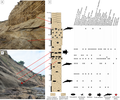Fossil
(Redirected from Fossil record)
A fossil is the preserved remains, impression, or trace of once-living organisms from a past geological age. These remnants can be of animals, plants, fungi, or microorganisms, and are typically found embedded in sedimentary rock formations. The complete collection of fossils and their placement within rock layers is known as the fossil record, which provides critical evidence for the history of life on Earth.
Etymology
The term fossil originates from the Latin word fossilis, meaning "dug up." Initially, in the 16th century, it referred to anything unearthed from the ground, including minerals and artifacts. Over time, its usage narrowed to mean preserved remains of ancient life.
Formation
Fossilization is a rare and complex process that typically requires rapid burial and mineralization. The most common scenario involves an organism dying in a **watery environment**, where it becomes quickly buried under layers of mud or sand. Over thousands to millions of years, mineral-rich water infiltrates the remains, and the organic material may slowly be replaced by minerals, forming a fossil.
Common methods of fossil formation include:
- Permineralization – minerals deposit into the porous parts of the organism (e.g., bones, wood)
- Casts and molds – the organism leaves an impression that gets filled and preserved
- Carbonization – a carbon imprint remains after the organic material decays
- Amber preservation – organisms trapped in tree resin, which fossilizes into amber
- Freezing or desiccation – rare but results in well-preserved specimens
Types of Fossils
Fossils are generally categorized into two main types:
- Body fossils: These include the preserved physical remains of organisms such as bones, teeth, shells, leaves, and stems.
- Trace fossils: These represent the activity of organisms, such as footprints, burrows, coprolites (fossilized feces), and nesting sites.
Study of Fossils
The scientific study of fossils is known as paleontology. Paleontologists use fossils to:
- Reconstruct extinct organisms and ancient ecosystems
- Understand evolutionary relationships between species
- Date and correlate rock layers (stratigraphy)
- Study major extinction and radiation events in Earth's history
Importance
Fossils are vital for understanding the biological and geological history of Earth. They serve as:
- Direct evidence for the process of evolution and common descent
- Indicators of past climates and environments
- Tools for identifying and dating different geologic time periods
Fossils also guide petroleum geologists in locating fossil fuel deposits such as coal, oil, and natural gas.
Fossil Gallery
See Also
| This article is a stub. You can help WikiMD by registering to expand it. |
Transform your life with W8MD's budget GLP-1 injections from $125.
W8MD offers a medical weight loss program to lose weight in Philadelphia. Our physician-supervised medical weight loss provides:
- Most insurances accepted or discounted self-pay rates. We will obtain insurance prior authorizations if needed.
- Generic GLP1 weight loss injections from $125 for the starting dose.
- Also offer prescription weight loss medications including Phentermine, Qsymia, Diethylpropion, Contrave etc.
NYC weight loss doctor appointments
Start your NYC weight loss journey today at our NYC medical weight loss and Philadelphia medical weight loss clinics.
- Call 718-946-5500 to lose weight in NYC or for medical weight loss in Philadelphia 215-676-2334.
- Tags:NYC medical weight loss, Philadelphia lose weight Zepbound NYC, Budget GLP1 weight loss injections, Wegovy Philadelphia, Wegovy NYC, Philadelphia medical weight loss, Brookly weight loss and Wegovy NYC
|
WikiMD's Wellness Encyclopedia |
| Let Food Be Thy Medicine Medicine Thy Food - Hippocrates |
Medical Disclaimer: WikiMD is not a substitute for professional medical advice. The information on WikiMD is provided as an information resource only, may be incorrect, outdated or misleading, and is not to be used or relied on for any diagnostic or treatment purposes. Please consult your health care provider before making any healthcare decisions or for guidance about a specific medical condition. WikiMD expressly disclaims responsibility, and shall have no liability, for any damages, loss, injury, or liability whatsoever suffered as a result of your reliance on the information contained in this site. By visiting this site you agree to the foregoing terms and conditions, which may from time to time be changed or supplemented by WikiMD. If you do not agree to the foregoing terms and conditions, you should not enter or use this site. See full disclaimer.
Credits:Most images are courtesy of Wikimedia commons, and templates, categories Wikipedia, licensed under CC BY SA or similar.
Contributors: Prab R. Tumpati, MD












